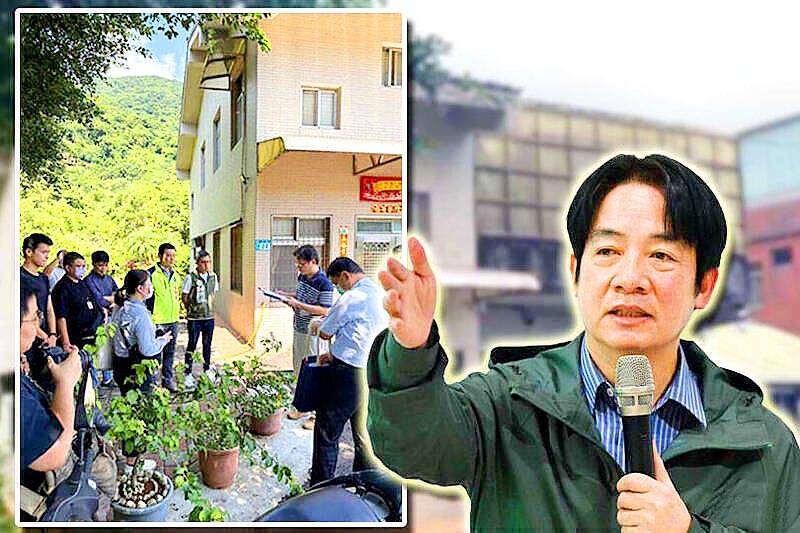President William Lai’s (賴清德) family home in New Taipei City has been turned into a miners’ museum and is to be open to the public for free from October, the Democratic Progressive Party (DPP) announced on Tuesday.
The property in Wanli District (萬里), as well as the nearby Liukeng coal mine and the ruins of its office, would form a cultural park aimed at educating the public about Taiwan’s mining history, the DPP told a news conference.
Reservations would be required and up to 20 people each on Fridays, Saturdays and Sundays would be allowed to visit, the DPP said.

Photo: Chen Cheng-yu, Taipei Times
In addition to an exhibition of photographs documenting miners’ lives, visitors would also have access to guided tours and oral history activities, it said.
In a Facebook post later on Tuesday, Lai encouraged the public to visit the site, which he said would “foster mutual understanding and help unify Taiwan.”
The property was at the center of controversy during Lai’s campaign leading up to the presidential election on Jan. 13.
The Chinese Nationalist Party (KMT) and the Taiwan People’s Party accused Lai’s family of illegally expanding the property and said that the building should have been torn down by the New Taipei City government years ago.
Lai said at the time that the house is one of hundreds of renovated miners’ units built decades ago in New Taipei City, where there used to be several mining districts.
However, mining companies closed and many of the original units were purchased and renovated for safety reasons, he said.
The units predate the Regional Planning Act (區域計畫法), which prohibits unauthorized expansion, he said.
Despite believing that the property does not contravene regulations, Lai said he was sorry that it became an issue during the presidential race and jeopardized the rights of residents living in similar units.
To commemorate the contributions made by miners to Taiwan’s economic growth in the past century, Lai late last year pledged that he would transfer the rights of the Wanli property to a charitable trust and prioritize turning it into a miners’ museum.

Taiwan is to commence mass production of the Tien Kung (天弓, “Sky Bow”) III, IV and V missiles by the second quarter of this year if the legislature approves the government’s NT$1.25 trillion (US$39.78 billion) special defense budget, an official said yesterday. Commenting on condition of anonymity, a defense official with knowledge of the matter said that the advanced systems are expected to provide crucial capabilities against ballistic and cruise missiles for the proposed “T-Dome,” an advanced, multi-layered air defense network. The Tien Kung III is an air defense missile with a maximum interception altitude of 35km. The Tien Kung IV and V

The disruption of 941 flights in and out of Taiwan due to China’s large-scale military exercises was no accident, but rather the result of a “quasi-blockade” used to simulate creating the air and sea routes needed for an amphibious landing, a military expert said. The disruptions occurred on Tuesday and lasted about 10 hours as China conducted live-fire drills in the Taiwan Strait. The Civil Aviation Administration (CAA) said the exercises affected 857 international flights and 84 domestic flights, affecting more than 100,000 travelers. Su Tzu-yun (蘇紫雲), a research fellow at the government-sponsored Institute for National Defense and Security Research, said the air

A strong continental cold air mass is to bring pollutants to Taiwan from tomorrow, the Ministry of Environment said today, as it issued an “orange” air quality alert for most of the country. All of Taiwan except for Hualien and Taitung counties is to be under an “orange” air quality alert tomorrow, indicating air quality that is unhealthy for sensitive groups. In China, areas from Shandong to Shanghai have been enveloped in haze since Saturday, the ministry said in a news release. Yesterday, hourly concentrations of PM2.5 in these areas ranged from 65 to 160 micrograms per cubic meter (mg/m³), and pollutants were

Taiwan’s armed forces have established response protocols for a wide range of sudden contingencies, including the “Wan Chun Plan” to protect the head of state, the Ministry of Defense (MND) said today. After US President Donald Trump on Saturday launched a series of airstrikes in Venezuela and kidnapped Venezuelan President Nicolas Maduro, concerns have been raised as to whether China would launch a similar “decapitation strike” on Taiwan. The armed forces regularly coordinate with relevant agencies and practice drills to ensure preparedness for a wide range of scenarios, Vice Minister of National Defense Hsu Szu-chien (徐斯儉) told reporters before a